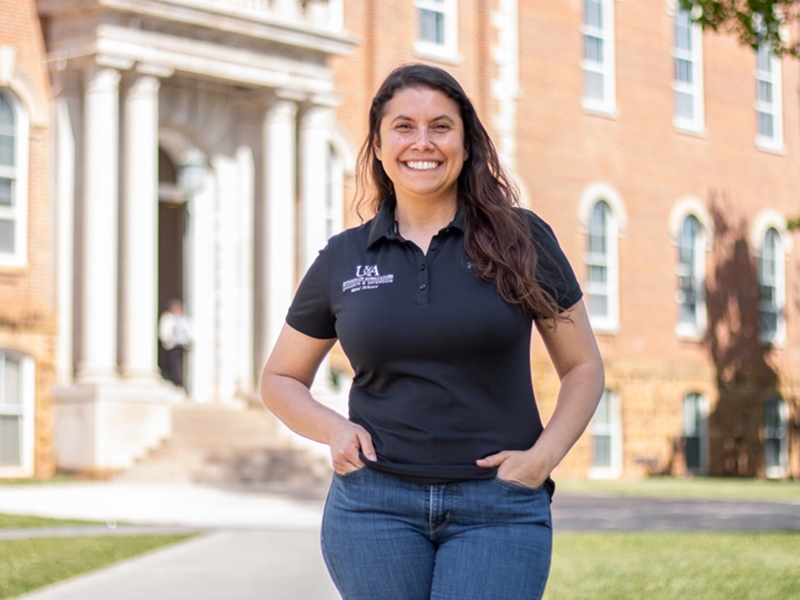Graduate and international education is all about discoveries — the discovery of knowledge, the discovery of research and creative scholarship that improves lives, and the discovery of new countries, cultures and people. The Graduate School and International Education is celebrating our students, faculty and staff who make discoveries happen at the University of Arkansas.
As an undergraduate student in Brazil, Pamela Carvalho-Moore was selected as a fellow for the Science Without Borders program, giving her the opportunity to select from universities across the globe to study agriculture. She chose the University of Arkansas, and it's a choice that's been paying off ever since.
"My undergraduate advisor completed part of his Ph.D. at the U of A, and he told me I was going to like it here," she said. "He pointed out that the U of A had a strong Weed Science Program, which was my area of interest. Additionally, he emphasized that the program received him with open arms, and still today, he is in contact with many friends made during that time."
Carvalho-Moore initially spent a year and a half at the U of A studying crop and environmental sciences. During this period, she volunteered for a nine-month internship in Weed Physiology and Molecular Biology at the former Altheimer Laboratory.
She immediately fell in love with the U of A. Through the university, she experienced not only research into Arkansas agriculture, but also the hospitality of the Natural State. Coming from a small state in Brazil, she was impressed by the diverse cultures and backgrounds she encountered each day, and how the Razorback nation embraced her with open arms.
"Arkansas is my home," she said. "I love all the outdoor activities this region has to offer. There's so many trails and hiking opportunities with easy access, like Lake Fayetteville and Devil's Den State Park."
After earning her bachelor's degree from the Federal University of Pampa in Brazil, Carvalho-Moore returned to the U of A to pursue her master's degree in cell and molecular biology with Nilda Roma-Burgos. Pamela is now a Doctoral Academy Fellow in the Crop, Soil and Environmental Science (CSES) department, specializing in weed science under the advisement of Dr. Jason Norsworthy. Her passion for agriculture began with her grandfather's cocoa farm in the Amazon region of Brazil.
"My grandfather was a successful cocoa farmer up until 1990, when the Brazilian president froze all saving accounts," she said. "However, he never lost his passion for agriculture, and he passed it onto me. I learned very early that food production takes work, time, and knowledge, but it is extremely rewarding. He is still involved in agriculture, and has coffee trees on a farm that he runs with my uncle."
Carvalho-Moore's dissertation research focuses on the use of metabolic inhibitors to improve the efficacy of the herbicide glufosinate, as well as understanding the resistance mechanism to glufosinate in resistant Palmer amaranth plants from Arkansas. Her master's and doctoral studies have challenged her both personally and professionally.
"I'm a completely different person than the one that began pursuit of a master's degree in 2018," she said. "I feel like a professional, one comfortable talking about any facet of weed science. The CSES has a very respectful atmosphere among students and faculty, and I feel comfortable sitting with my professors and talking about our projects. My opinions are valuable to them. "
Carvalho-Moore also found a family in the CSES department. In 2021, her brother died in a tragic accident, and she found support from the community of friends she had made in graduate school.
"Navigating through grief will never be easy. Without the support of my graduate fellows and my advisor, I am not even sure if I would have stayed to complete my Ph.D.," she said. "There was nothing that could be said, but they were there for me in many ways. I will always respect and be grateful to them for that. I am glad I chose to stay at the U of A for my graduate studies."
Since becoming a doctoral student, Carvalho-Moore stepped outside her comfort zone by embracing leadership roles not just across campus but in the community as well. She served as a department representative for the Graduate Student Professional Congress at the U of A, as well as president for the Crop, Soil and Environmental Science graduate student organization. She currently serves as president for the Weed Science Society of America graduate student organization.
"I really try to get involved and give back like others have given to me," she said. "That's the best way to meet people and to know what's going on at our university and in society."
The U of A has provided numerous resources for Carvalho-Moore's success during her academic journey. Thanks in part to the Graduate School and International Education's travel grants, she has attended national and international conferences, including six within a recent three-month span. It was also through the GSIE that she learned about the opportunity to apply for the prestigious P.E.O. Scholar Award to which she applied and was selected.
After graduation, Carvalho-Moore plans to continue studying sustainable solutions for how to overcome weed resistance to herbicides.
Her advice to other international students? "Open your mind and your heart. You will be surprised with the outcome. There are many wonderful people that will love to meet you as long as you open that space."
"Try to know other cultures and enjoy your time here," she continued. "The U of A has a lot to offer. Get connected with your department and organizations around campus. That's how I met a lot of my friends, leading to a support network throughout my time here."
Topics
Contacts
John Post, director of communications
Graduate School and International Education
479-575-4853,
